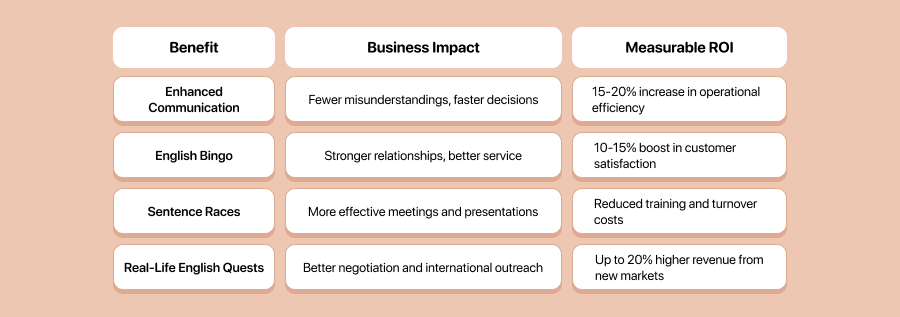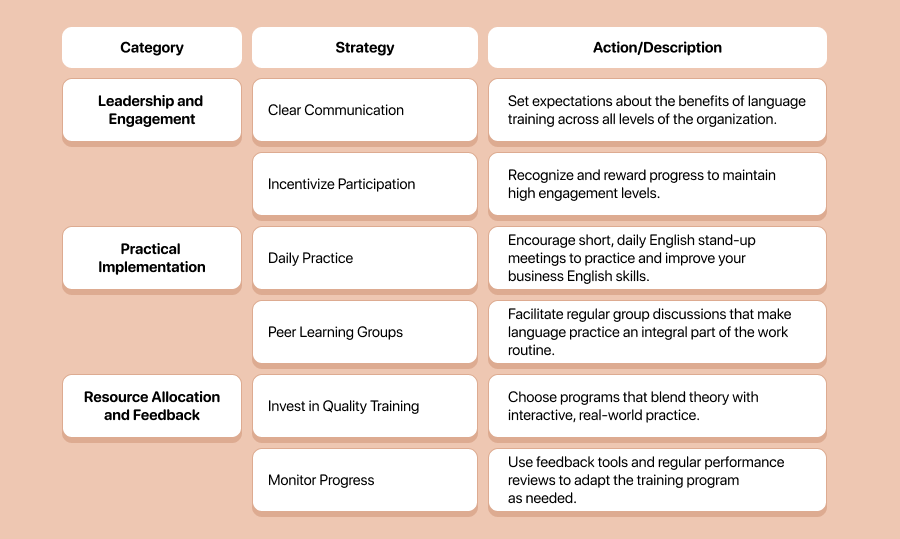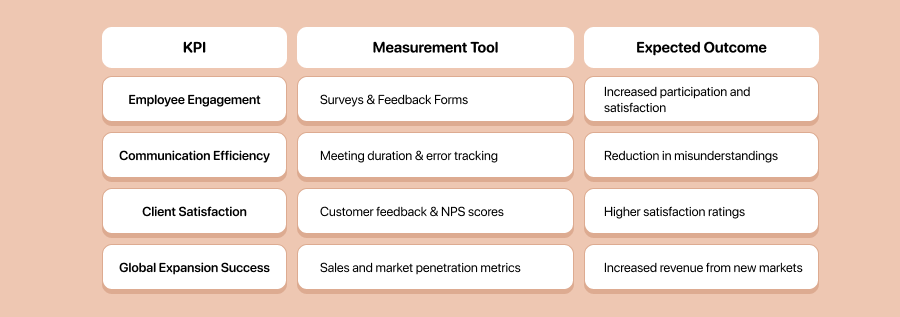In today's global economy, clear communication is more critical than ever. When your team masters business English, they work better together and unlock exciting opportunities in new markets. This guide is packed with easy-to-follow strategies, handy tables, and real-world examples to help you launch effective language training programs.
Why Invest in Business English?
For HR professionals questioning what business English is in a corporate context, think of it as a specialized course that transforms basic language knowledge into a strategic asset. Companies that choose to learn business English are not just upgrading communication — they are empowering employees with critical skills that drive productivity and growth.
Understanding Business English and Its Corporate Impact
Business English extends beyond grammar and vocabulary — it encompasses the terminology, tone, and strategies essential for clear and effective communication in professional settings.
Essential Components:
- Clarity & Precision: Ensures messages are correctly interpreted.
- Cultural Relevance: Integrates industry-specific language and etiquette.
- Adaptability: Tailors communication styles for diverse global markets.
The Business Case: ROI of Language Training
HR professionals need data-driven reasons to invest in language programs. Below is a table summarizing the benefits and measurable returns from implementing comprehensive business English training.
Benefits and ROI of Business English Training

(Note: ROI estimates are synthesized from industry research, including reports by The Economist Group and language training providers.)
Effective Methods for Employee Language Development
To ensure that your team gains comprehensive business communication skills, adopting a multifaceted approach is essential. Here’s how to effectively structure your language training programs:
Interactive and Immersive Learning
- Blended Learning Programs: Combine in-person workshops with digital modules to cater to different learning styles.
- Role-Playing and Simulations:Engage employees in real-world scenarios — such as mock business English conversation sessions simulating a high-stakes interview or client meeting—to build confidence and fluency.
- Applications:Instead of solely relying on traditional online platforms, leverage dedicated language learning applications. For example, the EWA app offers lessons designed to fit seamlessly into your organization’s workflow. EWA’s solution is tailored for corporate training, providing interactive content and real-time progress tracking. Discover more about their corporate offer at EWA Business Solutions.
Expanding Vocabulary and Idiomatic Fluency
- Daily Challenges:
Introduce a “word of the day” to expand business English vocabulary using practical application in everyday tasks. - Interactive Quizzes:
Use digital flashcards and quizzes to reinforce new terms and idioms. - Contextual Learning:
Integrate business English idioms into role-playing sessions and real-world scenarios to ensure contextual understanding.
Advanced Programs for Leaders
For executives, offering advanced English for business communication is essential. Tailored sessions focus on strategic language use, persuasive presentations, and crisis management.
- Specialized Workshops:
Business English for Managers programs emphasize effective communication strategies for high-level negotiations. - Mentorship and Coaching:
One-on-one coaching ensures personalized progress, enhancing overall speaking proficiency and leadership presence.
Integrating Language Training into Corporate Culture
Creating a supportive environment is crucial for the success of any training initiative to improve the business English of the employees. HR can foster a culture of continuous learning with these strategies:

Measuring Success: KPIs and Continuous Improvement
To justify your investment and drive ongoing enhancements, it’s vital to track the performance of your language training initiatives. Consider these key performance indicators (KPIs):
KPIs for Business English Training

Regular monitoring will enable your HR team to make data-driven decisions and improve training outcomes.
Advanced Training for Leadership: Elevating Managerial Communication
For managers, language proficiency is not just about fluency — it’s about strategic communication. Tailored programs for business English communication equip leaders with the skills needed for impactful negotiations and decision-making.
Focus Areas for Managerial Training:
- Persuasion and Influence:
Techniques to motivate teams and drive organizational change. - Conflict Resolution:
Strategies for managing disputes with clarity and diplomacy. - Strategic Presentations:
Mastering the art of persuasive presentations that capture stakeholder interest.
Empowering your workforce with top-tier English language skills is not just an educational upgrade — it’s a strategic move that directly contributes to global business success. By adopting a structured approach, you can significantly enhance internal efficiency and market competitiveness.


















